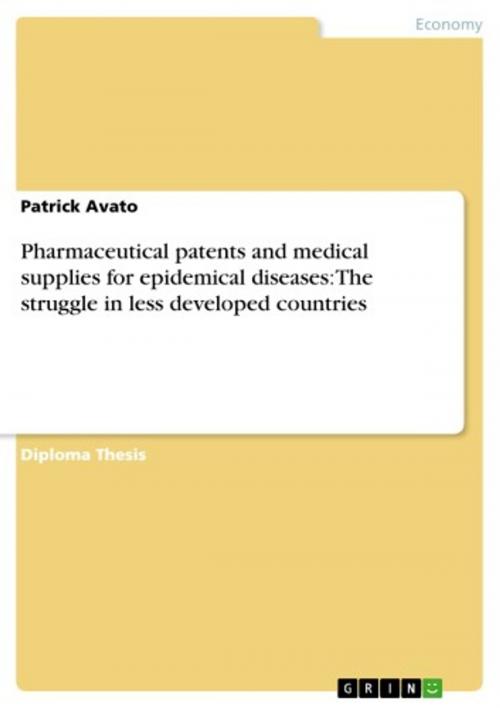Pharmaceutical patents and medical supplies for epidemical diseases: The struggle in less developed countries
Business & Finance, Industries & Professions, Insurance| Author: | Patrick Avato | ISBN: | 9783638291545 |
| Publisher: | GRIN Publishing | Publication: | July 14, 2004 |
| Imprint: | GRIN Publishing | Language: | English |
| Author: | Patrick Avato |
| ISBN: | 9783638291545 |
| Publisher: | GRIN Publishing |
| Publication: | July 14, 2004 |
| Imprint: | GRIN Publishing |
| Language: | English |
Diploma Thesis from the year 2004 in the subject Economy - Health Economics, grade: 1.0 (A), University of Tubingen (Wiwi Faculty), 98 entries in the bibliography, language: English, abstract: The last century has been characterized by great advancements of pharmaceuticals and a worldwide rise of life expectancy. Improvements in medical research have yielded significant progress in treating diseases that only recently were deemed incurable. This is most obvious in the case of HIV/AIDS where considerable public and private investments have converted this killer into a manageable chronic disorder for many in the developed world. However, treatment is out of reach for almost 90 percent of the millions of infected people in the developing world. Tragically, AIDS is not the only pandemic threatening the developing world. Malaria and Tuberculosis are only the most prominent of a large number of epidemical diseases affecting the world's poor. Overall, about ten million people die through infectious diseases each year, more than 90 percent of whom in the developing world. These people do not receive treatment for their diseases - either because they cannot afford treatment or because treatment for their diseases does not exist. The following paper discusses these issues form an economic and institutional perspective, focusing on the most crucial aspects of pharmaceuticals in the developing world: the development of new pharmaceutical innovations and access to these products for the poor. In order to put the discussion into perspective, chapter 1 discusses the current situation of public health in LDCs and its problematic economic and social consequences. The situation is then confronted with the current state of intellectual property rights in international law. Chapter 3 introduces a discussion of the functioning and the theoretical justification of patents and their relation to the economics of pharmaceuticals. It will be shown how certain characteristics of pharmaceuticals and their production process make a political intervention necessary. However, as this policy instrument also causes considerable social costs, the trade off between these costs and benefits is thoroughly analyzed. Building on this framework, chapter 4 examines the potential effects of an international adoption of (TRIPS like) patents on the availability of drugs in LDCs. This analysis leads to certain conclusions, which form the foundation of the possible solutions to the dilemma presented in chapter 5. Chapter 6 concludes this study.
Diploma Thesis from the year 2004 in the subject Economy - Health Economics, grade: 1.0 (A), University of Tubingen (Wiwi Faculty), 98 entries in the bibliography, language: English, abstract: The last century has been characterized by great advancements of pharmaceuticals and a worldwide rise of life expectancy. Improvements in medical research have yielded significant progress in treating diseases that only recently were deemed incurable. This is most obvious in the case of HIV/AIDS where considerable public and private investments have converted this killer into a manageable chronic disorder for many in the developed world. However, treatment is out of reach for almost 90 percent of the millions of infected people in the developing world. Tragically, AIDS is not the only pandemic threatening the developing world. Malaria and Tuberculosis are only the most prominent of a large number of epidemical diseases affecting the world's poor. Overall, about ten million people die through infectious diseases each year, more than 90 percent of whom in the developing world. These people do not receive treatment for their diseases - either because they cannot afford treatment or because treatment for their diseases does not exist. The following paper discusses these issues form an economic and institutional perspective, focusing on the most crucial aspects of pharmaceuticals in the developing world: the development of new pharmaceutical innovations and access to these products for the poor. In order to put the discussion into perspective, chapter 1 discusses the current situation of public health in LDCs and its problematic economic and social consequences. The situation is then confronted with the current state of intellectual property rights in international law. Chapter 3 introduces a discussion of the functioning and the theoretical justification of patents and their relation to the economics of pharmaceuticals. It will be shown how certain characteristics of pharmaceuticals and their production process make a political intervention necessary. However, as this policy instrument also causes considerable social costs, the trade off between these costs and benefits is thoroughly analyzed. Building on this framework, chapter 4 examines the potential effects of an international adoption of (TRIPS like) patents on the availability of drugs in LDCs. This analysis leads to certain conclusions, which form the foundation of the possible solutions to the dilemma presented in chapter 5. Chapter 6 concludes this study.















